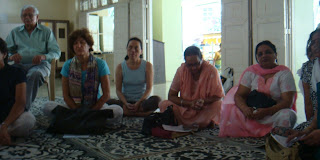Swadhyaya on Abhyasa
Saturday, 19 May 2012
Swadhyaya on Abhyasa
Swadhyaya on Abhyasa
Swadhyaya - The Yoga Institute Alumni Association
organized its first meeting after reconstitution of the Managing committee on
Sunday 13 May, 2012 which was attended by 28 participants at 11 am.
Welcome
Geeta Udasi, the Chairperson welcomed the
participants and explained the main objective of the Swadhyaya Group, “The Yoga
Institute Alumni Association is a platform for all the Trained Teachers (3/7/12
monthers) to maintain and enhance fellowship amongst the qualified teachers of
the Yoga Institute, to review and maintain the bond between these teachers and
the Institute as well as its teachings, to interact and share experiences and
showcase their talents etc.”
She then invited views of the participants about their
understanding of what Swadhyaya’s activities should be, their interest to remain
associated with the group and their vision about their own role as members of
the group.
To summarize, all felt that self development and understanding
one’s own self could be possible by sharing and learning from each other. Regular
meetings could strengthen fellowship and benefit all.
Recreation
The sharing session was followed by a recreation
activity conducted by Shreyas Munshi. Activities like Dumb Charades helped
break the ice where beautifully formed yoga sentences were depicted by some of
the participants silently to be guessed by group members. Participants got the opportunity
to guess and show their clear understanding and communication skills.
Suchitra Pareekh had a lively sharing session inviting
the group to express their views on what they consider as Abhyasa and what is it that anyone was practicing to the effect of Abhyasa. The sharing was then put into
context with reference to the Yoga Sutra 1.12 where Abhyasa is suggested by Maharshi Patanjali for the highest kind of
students after stating the mental modifications which occupy the mind which is
not in Nirodha state.
Overview
on Abhyasa by Niranjan Gogia
The overview of the concept of Abhyasa was sent by Niranjan Gogia which is being reproduced below.
"In Yoga Sutra, the concept of Abhyasa and Vairagya comes in chapter I as a technique to control the modifications or Vrttis of the mind. But practically we are hardly aware of the innumerable fluctuations the mind is
undergoing. So how do we do Abhyasa
to control these Vrttis?
In our daily life, we are hardly doing anything
which can be equated to
Abhyasa, towards control of the Vrttis. As far as yoga practice or
Sadhana is concerned, some of us may
be relatively regular in our
Asana, Pranayama practices. Very few of us might be practicing Yamas
and Niyamas consciously as a
daily practice of yoga. Do these
constitute Abhyasa? If yes, how they
are helpful in control of the
Enjoying and experiencing such states of mind by various techniques
and our efforts put forth for the same voluntarily, constitutes
Abhyasa. The important point here is
that we are willfully, consciously
and as a Sadhana, doing something
that helps in change in the
mental states. Howsoever little or temporary it may be. A good
Sukhasana or a good Savasana can lead to a very calm and
self aware
There
are many members who have not been able to share on the topic this time so
please write your views on the blog http://swadhyayatyi.blogspot.in
so we can get to learn from each other.
Conclusion
by Hansaji J. Yogendra
Finally, Hansaji explained that we normally work
with confusion and variety of external objectives but in the process we ignore
our own self. Swadhyaya is a platform where the like-minded teachers meet in
union and try to understand themselves by sharing their understanding and
experience of life.
We work on our emotions, our weaknesses, our
strengths by selecting right activities, working on them with full participation
on continuous long-term basis, but with devotion so that activity gives us
direction to progress. She suggested that this Sangh [union] should grow and include maximum number of teachers
for giving opportunity to all for learning from each other.
Next
meeting
The next monthly meeting of the members will be held
on Sunday, 10th June 2012 at 11.00 am at The Yoga Institute, Mumbai.
Those who have not yet sent their membership form
may please do as early as possible so that you are registered as a member of
the association and you remain in touch. Presently our mode of communication
will be by email only. Our email address is swadhyayatyi@gmail.com.
You
can visit us on the web www.theyogainstitute.org
and can download membership form or our blog http://swadhyayatyi.blogspot.in/
or can share your views on Facebook: https://www.facebook.com/pages/Swadhyaya-TheYogaInstituteAlumniAssociation/329177030485889
or
Subscribe to:
Post Comments (Atom)






No comments:
Post a Comment
Note: only a member of this blog may post a comment.